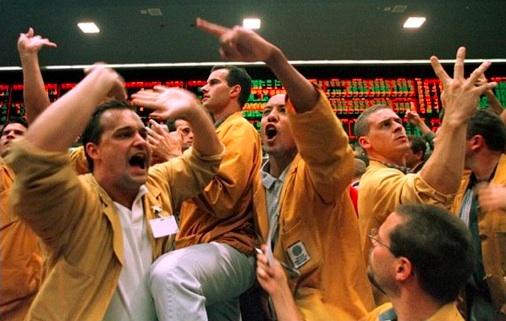As Deutsche Bank's George Saravelos politely puts it, "Developments since the Greek election on Sunday have moved very fast." And indeed, so far the new Tsipras cabinet, and here we focus on the words and deeds of the new finance minister Yanis Varoufakis, has shown that the market's greatest hope - that the status quo in Greece will continue - has been crushed into a pulp (and so have Greek stock and bond prices) especially following yesterday's most
recent comments by the finmin in which he said that Greece "
does not want the $7 billion" from the Troika agreement and that it wants to "rethink the whole program", culminating with an epic exchange with Eurogroup chief Jeroen Dijsselbloem in which Greece made it clear that the "constructive talks" are over.
And suddenly the Eurozone is stunned, because what had until now been its greatest carrot when it comes to dealing with Greece, has become completely useless when the impoverished, insolvent nation itself says it no longer needs a bailout, seemingly blissfully unaware of the consequences.
So earlier today the ECB's Erikki Liikanen, tired of pleasantries and dealing with what to Europe is a completely incomprehensible and illogical stance, one which is essentially a massive defection by Greece in the European "prisoner's dilemma", and which while leading to a Greek financial collapse and Grexit -both prerequisites to a subsequent Greek economic recovery unburdened by the shackles of the Euro - would also unleash a European depression, came out and directly threatened Greece that it now has 1 month until the end of February to reach a deal with the Troika, or else the ECB would cut off lending to Greek banks, in the process destroying the otherwise insolvent Greek banking sector.
And since only the ECB backstop has prevented a banking sector panic, the ECB is essentially betting the house, and the sanctity of the Eurozone (because after a Grexit all bets are off which peripheral leaves next) that the threat, and soon reality, of a bank run (at last check Greece had about €145 billion in deposits still left in its bank after JPM's latest estimate of €15 billion in outflows in January) will finally force Varoufakis and Tsipras to sit at the negotiating table with the understanding that not they but the Troika has all the leverage.
A deal on extending Greece's bailout deal must be found by the end of February or the European Central Bank will not be able to continue lending to its banks, ECB council member Erkki Liikanen said on Saturday. Europe's bailout programme for Greece, part of a 240-billion-euro ($270 billion) rescue package along with the International Monetary Fund, expires on Feb. 28 and a failure to renew it could leave Athens unable to meet its financing needs and cut its banks off from ECB liquidity support.
Greece's new leftist government, which aims to ease the strict terms of the bailout that have imposed harsh austerity, opened talks with European partners on Friday by flatly refusing to extend the current programme or to cooperate with the international inspectors overseeing it.
"We (ECB) have our own legislation and we will act according to that... Now, Greece's programme extension will expire in the end of February so some kind of solution must be found, otherwise we can't continue lending," Liikanen, also the governor of Finland's central bank, told public broadcaster YLE.
"I don't believe that one can hide from the realities in the economy," he said in an interview.
And then another hint from the ECB, this time from Vitor Constancio. As
Bloomberg notes, "at the moment, Greece has a special dispensation from the ECB because it’s complying with a bailout program. That means its debt can be used in central bank refinancing operations even though it is rated junk.
“There will be no surprises if we find out that a country is below that rating and there’s no longer a program that that waiver disappears,” ECB Vice President Vitor Constancio said at an event in Cambridge, England, on Saturday."
The question arose why when Greece already has undergone a Private Sector Involvement restructuring, i.e. a bankruptcy that however only impacted private entities and not official ones, such as the ECB, can't Greece have another debt haircut to which Liikanen responded that: "A significant debt restructuring has been carried out with private investors. The ECB cannot fund a state directly, which is what it would mean in this case."
Odd: because that is precisely what the ECB is doing with QE, when it monetizes any of a number of Eurozone deficits. To this Liikanen also had a quick response:
- LIIKANEN SAYS ECB ISN'T FINANCING EURO GOVERNMENTS' DEFICITS
Well, it is, but we'll let that slide for the time being. The bigger issue is that since the ECB directly holds tens of billions of Greek debt, any impairment on this debt would crush what the ECB has been saying from day one: that it can not suffer losses on the debt it has monetized or otherwise transferred over to its balance sheet. Such an impairment would immediately destroy Draghi's credibility, and promptly lead to furious screams from around the Eurozone as taxpayers suddenly realize all too well they are on the hook for funding the Eurozone's most insolvent members, first Greece and then everyone else who has already entered a toxic deflationary spiral. And since the ECB would finally be exposed for being Europe's "bad bank", the scramble to dump as much toxic exposure on Draghi would begin in earnest in the process launching the beginning of the end of the Eurozone.
One can almost see why Greece does think it has all the leverage.
That said, Greece now also has a countdown in which it can and will have to make a decision what to do with its leverage, and precisely 28 days until its very own D-Day which is now February 28, 2015 as per today's ECB threat.
So with February now shaping up to be an even more volatile month for Europe, and thus the world, than January and December (both of which closed red) here is the full schedule of events and what the "known unknowns are" in the next 4 weeks, courtesy of Deutsche Bank.
From George Saravelos' Update on Greece
It is worth bearing in mind that the timing, scope and commitment to the policy changes announced by Greek ministers is highly uncertain, not least because the legislative agenda is likely to be directed by the leadership team of the new government rather than individual line ministries. This still leaves plenty of uncertainty on the new government’s intentions. On the more negative side, the breadth of statements was so wide and the speed with which they were made so quick, that we now consider an extension of the February 28th program expiry date as a key date within the negotiation process: Europe and the Troika are very likely to request an explicit commitment from the Greek government to close the current mission review and not reverse previous policy. The precise form such a commitment would take is unclear at this stage, but our underlying assumption is that uncertainty around the new government’s policy intentions is so high, that Europeans will request assurances before proceeding with more in-depth negotiations over the program in Q2.
In turn, the above developments will likely have important implications for Greek bank financing at the ECB. Termination of the program on February 28th renders GGB-based collateral ineligible at Eurosystem refinancing operations, but still allows Greek banks to shift funding to Emerency Liquidity Assistance.However, ELA usage is under bi-weekly ECB review and is very likely to be on a rising trend over the next few weeks: to accommodate potential deposit flight; to absorb foreigners’ refusal to roll-over t-bills that are maturing; and to absorb fresh government t-bill issuance to finance upcoming debt repayments to the IMF and other obligations. These large needs make it likely that the availability of ELA usage is itself linked to program extension above.
All of the above then leaves three things that need to be clarified over the next few weeks.
First, under what conditions would the Troika be willing to extend the program and what form would this extension take? Our initial expectation was that a technical extension would have been offered to July followed by a successor ECCL program. Recent market developments and poor budget execution leave Greece’s ECCL eligibility an open question however, and it is possible that the Troika now only accepts program extension by a full year to coincide with the conclusion of the IMF program in March 2016. Such a large extension would be more difficult for the Greek government to manage domestically.
Second, does the ECB link Greek bank ELA provision to program extension as well? Given rising usage over the next few months, we would consider this an increasing possibility.
Third, what will the Greek government’s response to these conditions be? Public statements over the last 48-hours make it particularly difficult to envisage the government’s reaction function. On the one hand an offer of a one year extension and a written commitment to close the review would be particularly difficult for the government to manage domestically. On the other hand, the suspension of ECB financing of Greek banks would be exceptionally damaging to the economy.
Here is an indicative timeline of key events that will likely provide answers to these questions:
- Friday January 30th – Eurogroup President Dijsselbloem meets with the Greek finance minister Varoufakis and Deputy PM Dragasakis in Athens. A press conference will follow, with the meeting likely setting the tone of negotiations to follow.
- Sunday February 1st - Greek finance minister Varoufakis meets UK finance minister Osborne in London
- Monday February 2nd – Greek finance minister Varoufakis meets French finance minister Sapin in Paris Tuesday
- February 2nd - Greek finance minister Varoufakis meets Italian finance minister Padoan in Rome
- Wednesday February 4th-5th – Bi-weekly ECB review of ELA
- Wednesday February 4th – Likely t-bill auction to cover 1bn redemption on 6th
- Thursday February 5th - Greek parliament opens, elects new speaker of the House
- Saturday February 7-9th Government presents legislative agenda to parliament, vote of confidence midnight Monday 9th
- Wednesday February 11th – Likely tbill auction to cover 1.4bn maturity on 13th
- Thursday February 12th – European Council of EU Leaders, Tsipras likely to meet Merkel on sidelines
- Friday February 13th – Voting for new Greek President begins, EC Commissioner Avramopoulos most likely candidate as per various media reports, originating from New Democracy. Likely completed by second round on the following day requiring 151 MP majority
- Monday February 16th – Eurogroup where Greece likely to be top of agenda, conditions for extension of program to be made explicit by now
- Wednesday February 18th-19th- - Bi-weekly ELA review
- Saturday February 28th – Current EFSF program expires
In sum, developments and pressure on Greece have accelerated over the last few days, with a very large degree of uncertainty around both the Greek government’s and Troika’s position on how negotiations will proceed. We expect this to be ultimately resolved by a Troika request from the Greek side to commit to program completion and the broad contours of previously committed policy, particularly with regard to structural reform. In turn, program extension may itself be linked to ongoing ECB/ELA financing of Greek banks. The precise form this request takes and the Greek government’s reaction will ultimately determine the path Greece takes in coming weeks and months.










20150130180726.png&container=blogger&gadget=a&rewriteMime=image%2F*)







